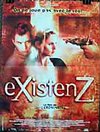



Lecture 8 Summary...
What I have learnt from my fellow classmates blogs is that the Lecture 8 began with an introduction to the film "Existenz" made in 1999 by David Cronenberg. http://www.imdb.com/title/tt0120907/ I research a little about this film and discovered the film is about a game designer who creates a virtual-reality game that tapes into the players' minds. Will have to hire it out one day and view it. The idea that someone can tap into another person's brain through the use of a computer game is pretty creepy and out there..and sounds like a definate invasion of privacy..
The main theme of Lecture 8 was Democracy. Democracy has exsisted from early history and even up till today. Australia and America's societies are a classic example of democracy. Democracy indicates a form of government where all the state's decisions are exercised directly or indirectly by a majority of its citizens through a fair elective process. When these factors are met a government can be classified as such.
Steven Stockwell was guest lecturer and addressed issues such as Gaps in Mass Media which involves Media Democracy. An interesting quote from lecture;
"The increasing concentration, centralisation and commercialisation of the mass media appears to have foreclosed avenues for democratic participation in currently existing representative democracy. "
Is Media and democracy going hand in hand? It would seem so...With theorists such as Habermas arguing, "political debate flourished to produce an independent sphere of influence from which the emerging bourgeoisie could criticise the state and civil society". Habermas also argues that commercialisation of the press in the nineteenth century saw the transformation of the public sphere, and its newspapers in particular, from the journalism of private persons to 'the consumer services of the mass media' which privileged the private interests of owners and advertisers.
The lecture also mentions famous theorists:
- Marshall McLuhan
- Mark Posters
- Hans Magnus Enzensberger
- Walter Benjamin
- Helen Irving
- Stuart Hall
- John Fiske
- John Hartley
Other topics that were covered Free Speech and Censorship and Citizen-Hacker: Doing Global Democracy.
With the Internet being used by everyday 'normal' people and government type people there seems to be a difference in how the parties use it. The internet gives the normal people the right to say what they want, when they want and how they want to and its something that the government, i suppose, sees as a threat to their power, a.k.a -cyber democracy. I could be wrong though..I'm only winging this..but that is my opinion.. Normal people can research a lot about the government and come to gather their own opinions..
Censorship and Freedom on Speech on the Internet, Australia:

No comments:
Post a Comment